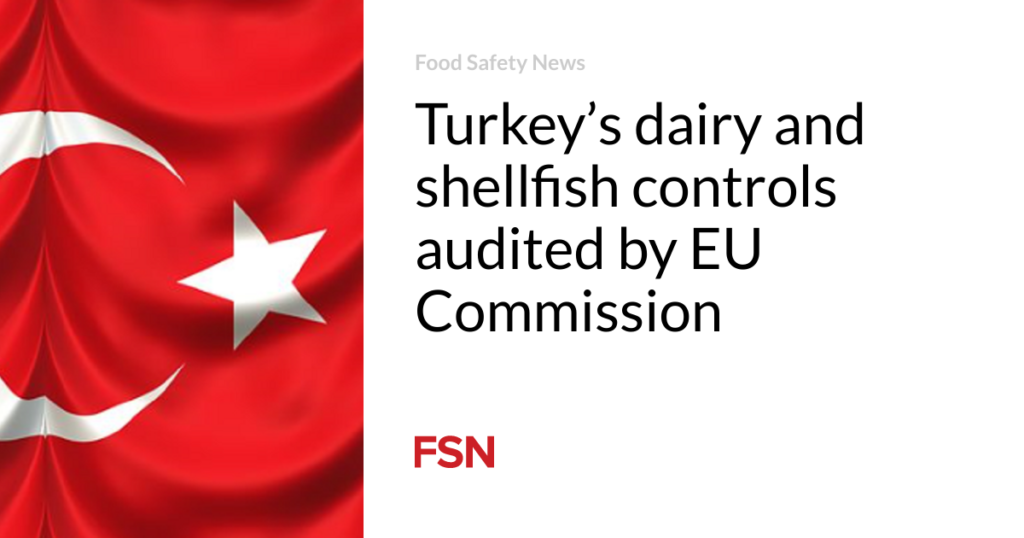The European Commission’s health and safety unit has published two reports on Turkey covering dairy products and a follow-up audit on bivalve mollusk controls.
The milk audit, carried out by DG Sante in September 2023, was largely positive, but four recommendations were made.
Turkey is authorized to send dairy products to the EU that need to undergo risk-mitigating treatment against foot and mouth disease (FMD). According to the Turkish Statistical Institute, the EU export volume (including ice cream containing milk fats) was 2,400 tons in 2021 and 6,398 tons in 2022.
Two dairy establishments visited by the audit team, storing and trading EU eligible products received from other sites, were not listed as EU cold stores. Turkish officials said this issue would be addressed.
A notice in late 2023 stated that if dairy products intended for export to Europe are stored in an EU-approved dairy establishment other than where they are produced, the site where storage takes place must also obtain EU approval as a cold storage facility.
Highlighted findings
At the time of the audit, there were 194 EU-certified bovine holdings, of which three were suspended as they had exceeded the limits for plate count or did not have results available during an inspection by local authorities.
In terms of microbial criteria, drains were not included in the sampling plans for Listeria detection in some establishments visited. There were also issues with the number of product samples taken to be tested, sometimes one instead of the five required by EU rules and Turkish legislation.
Product labels had, in some cases, not highlighted allergens in the English version.
In 2020 to 2022, 132 dairy samples (ready-to-eat milk and dairy products, milk and whey powders, butter, cheese, and ice cream containing milk fats) were taken in EU-export-listed establishments and tested for Listeria monocytogenes, 560 for Salmonella, and 417 for staphylococcal enterotoxins. No pathogens or staphylococcal enterotoxins were found.
In one case, the EU export certificate issued included a consignment produced from non-EU eligible raw milk. Turkish authorities suspended the site from EU export, opened an investigation, and said corrective action would be taken.
Auditors also found that certifying officials are not necessarily familiar with the situation in the EU-listed establishments for which they issue export certificates. Turkish authorities said local agencies had been instructed to ensure the participation of official veterinarians dealing with certification of dairy products to the EU in routine inspections carried out by control officers in the Food and Feed Branch of Provincial Directorates. Training on certification requirements was also planned in 2024 for official veterinarians issuing dairy export certificates to the EU.
Shellfish follow-up
The bivalve mollusk audit in May and June 2023 followed a 2021 visit to evaluate the control system on products intended for export to Europe. Six recommendations were made in the previous visit, and the 2023 audit focused on one judged the most critical.
Turkey cannot export live bivalve mollusks to the EU but can send frozen and processed ones. All consignments of bivalve mollusks must be tested at EU border control points for both E. coli in frozen bivalve mollusks and biotoxins in frozen and processed mollusks. Recently updated EU rules mean restrictions will apply until December 2026.
In 2022, Turkey exported 6,100 tons of frozen and processed bivalve mollusks and 142 tons of sea urchins to the EU.
The report concluded that authorities had made significant progress since the previous audit.
While official controls identified and addressed non-compliance in some cases, they remain mostly reactive. There are also weaknesses in identifying certain major non-compliances in food safety requirements and in the hazard analysis and critical control points (HACCP) system.
“As a result, some establishments approved for export to the EU still present critical structural and food safety processing deficiencies. This constitutes a food safety risk for the products exported from these premises,” said auditors.
DG Sante said the main recommendation from the 2021 audit remains unresolved due to gaps and deficiencies in the implementation of controls. This means the system does not provide the necessary compliance guarantees to export bivalve mollusks to the EU.
